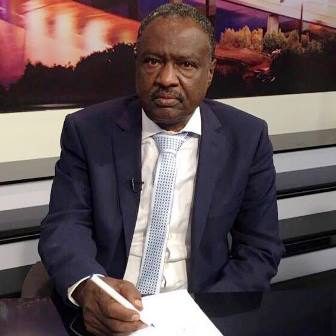Nairobi Earthquake

By Rashid Abdel Rahim
The day after the Rapid Support Forces (RSF) and their allied nations gathered in Nairobi—and before the announcement of the charter and parallel government—Kenya’s The Standard newspaper published a front-page story with a large image of Hemedti, captioned with a single word: Butcher.
This marked the beginning of an unexpected shockwave that unsettled the RSF and its foreign allies.
Kenyan opposition, media, and civil society escalated their rejection of the gathering, filing a petition with the Supreme Court against the Ministers of Foreign Affairs and Interior, as well as the Police Chief, demanding that they be prevented from allowing the assembly to proceed, arguing that it posed a threat to Kenya’s interests.
The strongest international stance came from the United States through a conversation between the Kenyan president and the U.S. Secretary of State, followed by a similar position from the United Nations. The announcement of a parallel government from outside a country is a threat to several African nations with separatist movements.
The Nairobi shockwave hit the RSF’s movements hard, both externally and internally. One major impact was the alliance with the rebel leader Abdelaziz al-Hilu, which sparked backlash among Nuba communities opposed to any agreement with the Janjaweed. This further expanded the RSF’s hostilities with various tribal factions in Darfur and Kordofan.
The rebels’ war has been fueled by ambitions beyond merely seizing control of the state. Their primary backing comes from foreign nations that are not necessarily concerned with the rebels’ cause but are driven by larger ambitions in Sudan. These countries seek more than just financial gains—they aim to control Sudan’s vast resources, extensive lands, and wealth as a strategic asset, compensating for their own territorial limitations and reliance on depleting oil reserves.
This explains the unwavering external support for the RSF, including the provision of weapons, equipment, funding, and political backing. The scale of international involvement is evident in the number of countries mobilized for their cause—before Kenya, there was Uganda, Chad, and even Togo, where they sought to leverage influence.
The foreign ambitions in our country make it clear that we face significant challenges and that this war will not end easily. Instead, it will persist in different forms and cycles.
Countering this requires substantial preparation, primarily a military strategy that must ultimately lead to the total destruction of the RSF’s military power in all its financial, armed, and human forms, as well as dismantling all its support networks.
Victory in this war is not merely about defeating the RSF but also about closing off all avenues that invite foreign greed in Sudan. This includes implementing economic regulations to restructure financial and trade dealings.
Sudan is an open country—our resources are smuggled, from gold to crops and livestock. Corruption remains the largest gateway for the theft of our national wealth. Our borders are porous, allowing unchecked smuggling and the free movement of people without visas or residency regulations. Even our nationality and passports are bought and sold.
Foreign ambassadors operate without oversight, engaging in unrestricted activities. Before them, and alongside them, Hemedti’s money was flowing through the country, buying politicians, officials, and tribal leaders with lavish gifts, freely distributed dollars, and fleets of Toyota Hilux pickups patrolling the streets.
Most alarmingly, many African nations—including their regional organizations—have leaders who are deeply entrenched in these transactional politics.
This situation demands far greater efforts than what is currently being exerted, alongside the extraordinary operations already being carried out by our armed forces.
— Originally published in Al-Muhaqiq



